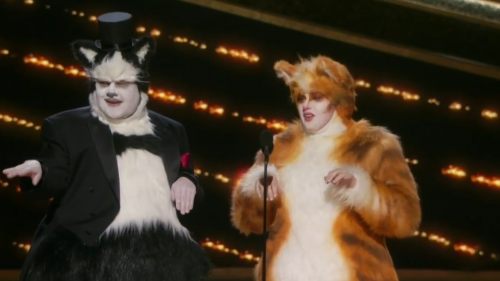How THE LOST WEEKEND Changed Movie Drunks, Won A Bunch Of Oscars, And Ruined One Writer
“Not only did I know it was going to make a good picture, I also knew that the guy who was going to play the drunk was going to get the Academy Award.”
In fairness to director Billy Wilder, he made the above super-confident statement after 1945's The Lost Weekend cleaned up at the Oscars. Still, that kind of boastfulness would be pretty crass from a director today, a display of moxie reserved for the likes of professional athletes and Vincent Gallo. But the world into which The Lost Weekend was released had never seen anything like it before, so perhaps Wilder’s peacocking is a bit earned.
Alcoholism was, up to that point, mostly used to comedic effect in films: Charlie Chaplin’s The Cure, for example, featured the star as a sauced playboy who checks into a health clinic for his problem and proceeds to taint the spa’s water supply with his stash of hooch, inebriating all the patients. WC Fields made an entire career out of mining booze-fueled misanthropy for laughs. Substance abuse was recognized as a serious problem in the real world, of course (Chaplin is clearly playing The Little Tramp in The Cure, but presents the character as wealthy to seem less insensitive about poking fun at working-class dipsomania), but a hundred years after the term “alcoholism” was coined, Hollywood still found drunkenness fairly hilarious. Those gears changed pretty hard with The Lost Weekend.
The marketing of The Lost Weekend focused on the film’s groundbreakingly serious presentation of the disease, and its trailer promised audiences a bold, savage account of a real-world social ill. The film begins as the camera enters through the apartment window of Don Birnam (Ray Milland), an anxious, irritable drunk who’s talking to his girlfriend (Jane Wyman) and brother (Phillip Terry) about having dried out and given up alcohol. The problem is, when we entered through the window a moment earlier, we noticed a bottle of liquor stealthily hanging from the sill by a rope. As soon as Don Birnam opens his mouth about not drinking, we know he’s lying. It’s the perfect setup as we strap in for the downward spiral that follows, as Don goes on a bender that takes him from bars to pawn shops to hospital wards to an hallucinatory fit in his apartment. Ray Milland, previously known for light comedy and action pictures, was a revelation as the tortured, tragic Don, his movie star polish giving way to some real, raw moments of humanity. And Wilder’s direction, coming a year after his seminal film noir Double Indemnity, bleeds the visuals of that burgeoning genre into Don’s story. The scene of Don staggering around a row of pawn shops, trying to hock his typewriter for booze money, was an unsettling image in 1945, due in no small part to the noir-esque, then-novel use of real locations and passersby.
Today a comedic actor going for broke in a dramatic role about “real issues” is the definition of Oscar bait, but it was less of a sure thing in 1945. Pitched during the end of World War II, Wilder was told by the studio that The Lost Weekend was too personal a bit of navel gazing for a country at war: “The audience doesn't care about the individual right now.” (Curiously, the film makes absolutely zero mention of the war, unusual for a 1945 drama.) But Don Birnam’s story, melodramatic as it may be, struck a chord with audiences, and racked up 11 million dollars at the box office. It went on to win Oscars for Best Picture, Best Actor, Best Director and Best Screenplay.
Time has done some interesting things to this film’s depiction of alcoholism. Don’s loving brother Wick and steadfast girlfriend Helen, for instance, are both portrayed as staunchly loyal to Don. At one point Wick spouts a pile of lies to cover for Don’s drunkenness in front of Helen; later in the film Helen begs Don to have a drink in order to get him out of a suicidal funk. Depicted as Don’s loving and long-suffering support network, today both characters could be seen as potentially lethal enablers. A nurse (Frank Faylen) whom Don encounters in a hospital’s alcoholics’ ward was described by critics in 1945 as “sadistic” and “glib,” yet today he’s clearly the only character in the film who speaks plain, hard truth to Don. New York Times critic Bosley Crowther’s praise of the film included a small complaint that the script didn’t offer a solid reason for Don Birnam’s alcoholism, and it’s still cited by some today as a deficit in the film. Yet if you buy into the modern school of thought, no external reason is necessary, or maybe even present. Alcoholics drink because they’re alcoholics, and in this regard the film is pretty progressive; no secret in Don’s past or character flaw needed.
Crowther also noted the film’s pat ending. While the novel ends with Don unrecovered, Wilder and co-screenwriter Charles Brackett go with a more Hays Code-compliant ending, in which Don symbolically drops a cigarette into the drink he’s poured, indicating to Helen that he’s through with the booze. (As if a floating cigarette butt would actually stop a real alcoholic from throwing back the shot.) Too tidy, claimed Crowther. But it occurs to me that as the camera tracks away from Don in the last scene, back out the window through which it entered 99 minutes earlier, we’ve ended the film exactly where we started - with Don claiming he was done drinking. The filmmakers have presented us with a Moebius strip, and it’s tough to imagine they didn’t realize it at the time. Maybe Don is done drinking, and maybe he's ten minutes away from his next bender. Appeasing the Hays Office - and happy endings in general - seems to be a matter of where you splice on the end credits.
The Hays Office didn’t follow one out of the theater into the real world, where tidy endings were neither mandatory nor likely. Charles Jackson, the author of The Lost Weekend’s autobiographical source novel, was the toast of Tinseltown during the optioning, development and eventual adaptation of his novel. Everyone, according to Jackson biographer Blake Bailey, wanted to meet the writer, who was mortified to discover that all Hollywood giants like Clark Gable and Spencer Tracy really wanted from him was to know his secret trick for sobriety. There wasn’t one, so he couldn’t give them one, and eventually the novelty wore off for Hollywood’s sauced glitterati. After an anticipated bidding war never happened, the author sold the film rights for the novel to Paramount for a low 35,000 dollars. He filmed a cameo in the film, but it was cut. Jackson eventually came to feel bitter toward Hollywood, lowballed for his life’s work and (in his opinion) left out of the conversation come Oscar time. Eventually Jackson found writing sober too difficult, returned to substance abuse and died of a Seconal overdose in 1968.



